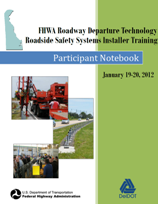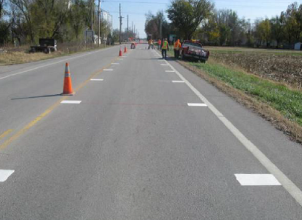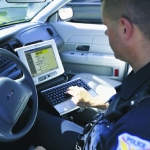KLS provides Federal,
State and local governments with specialized training in many aspects of road safety
and transportation operations. In addition, KLS has provided on-site technical
support to FHWA in highway safety.
KLS staff were past members of many US DOT Technical Working Groups on Geometric
Design, Safety, Pedestrian Safety, Older Drivers, Traffic Operations, Planning etc.
Today KLS staff is represented on national committees (e.g. TRB, USDOT, etc).
KLS has conducted research / evaluation for Federal , State and local governments
helping to develop guidelines, set standards, train or determine operational characteristics
as well as provide advice on technology deployment. KLS have evaluated various traffic
control devices (TCDs) from the engineering / operational, enforcement, educational,
behavioral, and human factors perspective.
|

|
|
FHWA Roadside Design Technology Transfer Program for Pennsylvania and Delaware
|
KLS provided specific technical expertise and support to PennDOT and DelDOT personnel for roadside
safety features such as longitudinal barriers, end treatments, attenuators, and transitions, with
emphasis on improving safety for all roads. Specific tasks included:
-
Workshops.
KLS developed and conducted four 2-day Roadside Safety System Design and Installer workshops
(35 participants each). Workshop audience included personnel from FHWA Division Office, State
DOT, District Office Design, Construction, and Maintenance, and LTAP Safety Specialists.
-
Roadside Safety Best Practices Guide.
Based on the results of the workshop KLS developed Best Practices Guide (Pocket Guide)
to help field personnel select, design, install, and maintain roadside safety hardware.
-
Technology Transfer Web Conferences.
KLS conducted four quarterly 2-hour Web conferences.
-
Certified Installer Training (CIT).
KLS developed and delivered the 2-day Certified Installer Training (CIT) training used by the
DOT for following roadside safety systems training modules様ongitudinal guardrail, end treatments,
attenuators, and transitions. The CIT provided industry personnel with updates to current
as-specified roadside safety policy, specifications and standard details on specific State-specified
components and/or systems of each of the aforementioned system modules.
|

|
|
DDOT ADA Compliance Training in the Public Rights-of-Way
|
KLS provided training in the requirements, guidelines, special considerations, and technical and legal
developments of Americans with Disabilities Act (ADA) compliance in the District of Columbia痴 Public
Rights-of-Way (PROW). The major tasks involved:
-
Workshops.
KLS developed and conducted a 3-day workshop (over 40 participants) for DDOT consultants, engineers,
and inspectors on advanced ADA compliance design. Similarly, four 1-day workshops were conducted to
train DDOT inspectors and Public Space Permit Office staff (over 100 participants) on the fundamentals of accessible design.
-
Technology Transfer.
KLS is in the process of facilitating interactive discussions with post-training participants about
experiences resulting from applying what they have learned to their jobs, offering opportunity to answer
questions and resolving ADA compliance issues encountered, identifying weaknesses or shortcomings in their
knowledge base, and highlighting areas where additional training is warranted.
-
Materials.
KLS also developed checklists and pocket guides to help participants give direction and
structure to compliance reviews and inspections with respect to ADA compliance.
|

|
|
FHWA Informational Report on Methods to Achieve Speeds on Rural and Suburban Roadways
|
The project objective is to develop an informational report that describes roadway treatments that result
in driver self-selection of appropriate operating speeds on curve and tangent sections of rural and suburban
roadways that are not access-controlled. This project involved the following tasks:
-
Synthesis of roadway features, treatments, and design processes that influence operating speeds and safety.
-
Identification and analysis of speeding-related crashes using local transportation agency data.
-
Identification and field evaluation of speed reduction treatments (high-friction surfaces, optical speed bars, converging chevron markings, and reallocation of roadway width).
-
Preparation of marketing, communications, and outreach plan to disseminate results of project to practitioners.
|

|
|
Ped Safe
|
|
The Pedestrian Safety Guide and Countermeasure Selection System provide practitioners with the latest
information available for improving the safety and mobility of pedestrians. The
system guides the user through a series of questions to aid in making safer decisions.
|

|
|
IHSDM
|
|
The Interactive Highway Safety Design Model is a suite of software analysis tools for evaluating safety
and operational effects of geometric design decision on two-lane rural highways.
It provides estimates of a design's expected safety and operational performance.
IHSDM results support decision making in the highway design process. KLS led the
development of the demonstration tool and provided other support.
|

|
|
Highway Design Handbook
|
|
This guide is designed to provide practical guidance to engineers to accommodate the needs and functional
limitations of aging population of road users. It includes recommendations which
are directed toward new construction, reconstruction, scheduled maintenance, and
'spot treatments' to ameliorate demonstrated safety problems. KLS led the development of the workshop to
train engineers on accommodating the elderly in highway design.
|

|
|
CDI Program.
|
|
KLS completed the development of the FHWA Crash Data Improvement Guide
and accompanying work shop. KLS is further tasked for providing support to
17 state DOT's to review, assess and provide technology support on their crash database
systems.
|
|
FHWA Work Zone Transportation Management Plan Samples, Templates, and Training Course
|
|
The project involved developing sample transportation management plans (TMPs) and templates, in accordance
with the regulations and guidance for the Work Zone Safety and Mobility Rule, (a) a significant project, and
(b) a project that is not significant but has moderate impacts. As part of the development process, KLS Project
Manager chaired a Technical Working Group (TWG) consisting of nationwide work zone experts (FHWA, CALTRANS, MDOT,
MDSHA, VDOT, AZDOT, RIDOT, ODOT, AZDOT, and WISDOT). KLS also developed a 6-module training course on TMP incorporating
Instructional System Design (ISD) principles.
|
|
FHWA Study of the Telematics Technologies on Safe Driving in Trucks
|
This project was intended to evaluate the driver safety benefits of a selected commercial motor vehicle
telematics system. As part of the project, KLS:
-
Assessed the current state of fuel monitoring and operations management systems.
-
Conducted a field demonstration of commercially available fuel-monitoring and operations management systems.
-
Evaluated motor carrier productivity benefits and related driver safety benefits.
-
Published a final report that identifies the safety and productivity benefits.
|
|